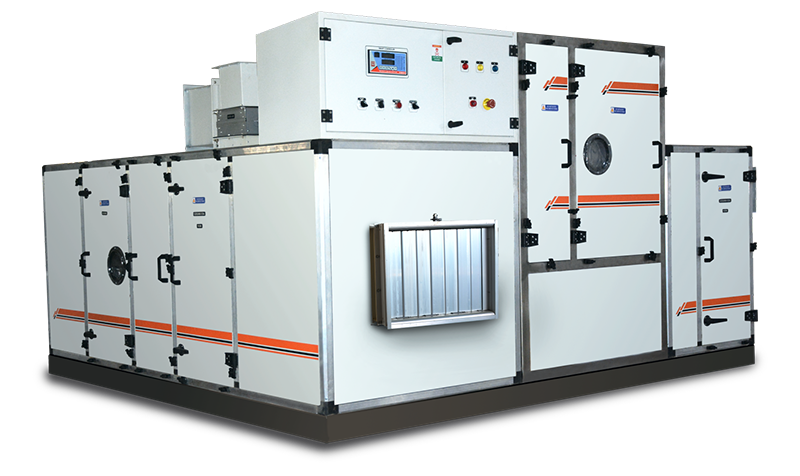Confectionery Industry Dehumidifiers

Confectionery
Moisture control is a critical factor in the production of confectionery at the Confectionery Plant. The failure to manage moisture levels can lead to various losses and problems throughout the production process. Let’s explore the challenges faced in the production of confectionery and discuss how Rehoboth's desiccant dehumidifier can provide effective solutions to these issues.
Benefits of Controlling Moisture with Rehoboth's Desiccant Dehumidifier:
1. Preservation of Ingredient Quality: The desiccant dehumidifier ensures that ingredients remain free from excess moisture, preserving their quality and enhancing the final product.
2. Mold Prevention: By maintaining optimal humidity levels, the dehumidifier actively prevents the growth of mold, ensuring confectionery safety and compliance with hygiene standards.
3. Enhanced Production Efficiency: Consistent moisture control streamlines production processes, reducing the likelihood of disruptions and improving overall efficiency.
4. Extended Shelf Life: The dehumidifier plays a crucial role in extending the shelf life of confectionery products, facilitating better storage and distribution practices.
Understanding the Problems:
1. Ingredient Quality: Moisture can affect the quality of confectionery ingredients, leading to inconsistencies in taste and texture.
2. Mold Growth: Excess moisture provides an ideal environment for mold growth, posing a threat to product safety and hygiene.
3. Production Efficiency: Moisture fluctuations can disrupt production processes, causing delays and inefficiencies.
4. Product Shelf Life: Improper moisture control can reduce the shelf life of confectionery, impacting storage and distribution.
How Rehoboth's Desiccant Dehumidifier Works:
Understanding the Problems:
1. Adsorption Process: The desiccant dehumidifier utilizes an adsorption process to remove moisture from the air, ensuring a dry environment in the Confectionery Plant.
2. Precise Humidity Control: Equipped with advanced controls, the dehumidifier allows for precise adjustment of humidity levels, catering to the specific requirements of confectionery production.
3. Continuous Operation: Rehoboth's dehumidifier is designed for continuous operation, providing uninterrupted moisture control throughout the production cycle.
4. Energy Efficiency: • Our desiccant dehumidifier is energy-efficient, contributing to cost savings while effectively managing moisture levels.


Chocolate
In the world of pharmaceuticals, moisture control plays a pivotal role in ensuring the quality and safety of tablets. The production of tablets in a Pharmaceutical Plant can be riddled with challenges, primarily stemming from moisture-related issues.
Understanding the Problem:
The pharmaceutical industry is no stranger to losses and difficulties. Moisture-related problems can occur at various stages, such as raw material storage, granulation, compression, and packaging. These issues lead to defects, reduced shelf life, and, ultimately, financial setbacks. Inadequate moisture control can be attributed to fluctuating environmental conditions, poor storage practices, and equipment inefficiencies.
Benefits of Moisture Control:
Moisture control is a critical aspect of pharmaceutical production, and it impacts the quality and safety of the drugs manufactured. Let's delve into why moisture control is vital in the production of drugs in pharmaceutical plants.
01.Enhanced Product Quality:
Proper moisture control ensures uniform tablet hardness, dissolution rate, and content uniformity, vital for delivering the right dose.
02.Extended Shelf Life:
Moisture-controlled storage prevents degradation and extends the tablets' usability period.
03.Cost Savings:
Minimized losses and rejections lead to significant cost reductions.
04.Regulatory Compliance:
Meeting moisture control standards is essential to comply with pharmaceutical regulations.
Moisture control systems, like dehumidifiers, monitoring devices, and well-designed facilities, are the keys to success.
Effective moisture control is not just a technicality; it's a cornerstone of pharmaceutical tablet production. Embracing these practices will not only ensure high-quality tablets but also safeguard your investments and maintain your facility's reputation in the pharmaceutical industry.

Candy
In the world of pharmaceuticals, moisture control plays a pivotal role in ensuring the quality and safety of tablets. The production of tablets in a Pharmaceutical Plant can be riddled with challenges, primarily stemming from moisture-related issues.
Understanding the Problem:
Moisture-related issues can disrupt the entire production process. Excessive moisture can lead to clumping, clogging, and inconsistency in capsule quality. In contrast, insufficient moisture can result in brittle capsules that easily break, rendering them useless. The fluctuating humidity levels in pharmaceutical plants can exacerbate these challenges, making precise control even more essential.
To address these problems, it is vital to employ state-of-the-art moisture control systems. These systems help maintain the ideal moisture content throughout the production process, ensuring the capsules remain intact, consistent, and high in quality.
Benefits of Moisture Control:
Effective moisture control yields numerous benefits. First and foremost, it enhances the overall product quality, reducing losses and waste. Additionally, it streamlines production processes, saving both time and resources. Furthermore, maintaining the correct moisture levels ensures product consistency, ultimately leading to customer satisfaction and trust in your pharmaceutical brand.
Investing in moisture control solutions is not just a cost-effective measure; it's a necessity for pharmaceutical plant owners and maintenance personnel to meet quality standards and regulations.
Moisture control is an indispensable aspect of pharmaceutical capsule production in any pharmaceutical plant. By understanding the challenges posed by moisture and embracing advanced moisture control technology, you can enhance product quality, streamline processes, and ultimately thrive in the competitive pharmaceutical industry. We encourage you to explore and implement effective moisture control systems to overcome these production hurdles and secure the success of your pharmaceutical plant.

Gummy
In the world of pharmaceuticals, moisture control plays a pivotal role in ensuring the quality and safety of tablets. The production of tablets in a Pharmaceutical Plant can be riddled with challenges, primarily stemming from moisture-related issues.
Understanding the Problem:
Moisture control is pivotal in pharmaceutical manufacturing, as it affects the quality and efficacy of Soft Gel Capsules. Excessive moisture can lead to a range of issues, such as capsule deformities, instability of active ingredients, and microbiological contamination. Moisture-related losses occur at various production steps, impacting the overall efficiency and product quality.
At the granulation and blending stages, excess moisture can cause clumping and uneven distribution of ingredients, affecting capsule uniformity. During the encapsulation process, moisture-induced capsule sticking and rupture can result in significant production downtime and increased rejection rates. Additionally, in storage and packaging, moisture can compromise the stability of the capsules, reducing their shelf life.
Benefits of Moisture Control:
Proper moisture control provides numerous advantages. It ensures product uniformity, enhancing the quality and consistency of Soft Gel Capsules. Controlling moisture levels safeguards the integrity of active pharmaceutical ingredients, preserving their potency. Moreover, it minimizes the risk of microbial contamination, thereby ensuring the safety of the final product.
Efficient moisture control also leads to increased productivity and cost savings by reducing downtime, minimizing capsule rejection rates, and extending the shelf life of the capsules. Ultimately, it contributes to the reputation of the pharmaceutical plant by consistently delivering high-quality products.
Moisture control is a critical aspect of Soft Gel Capsule production at pharmaceutical plants. By understanding the problems associated with moisture and implementing effective control measures, plant owners and maintenance personnel can significantly improve product quality, reduce losses, and ensure the overall success of their operations. It is imperative to invest in moisture control to secure the integrity and efficiency of your Soft Gel Capsule manufacturing process.
Freequently Ask Questions

01.How can excessive moisture affect drug production?
Excessive moisture can lead to product degradation, contamination, and reduced shelf life, impacting both quality and safety.
02.What are the common moisture-related problems in pharmaceutical plants?
Common issues include clumping of powdered ingredients, mold growth, and degradation of drug formulations.
03.How does a desiccant dehumidifier help in energy savings?
By efficiently removing moisture from the air, desiccant dehumidifiers reduce the load on air conditioning systems, leading to energy savings.
04.Can a desiccant dehumidifier be integrated into an existing pharmaceutical plant setup?
Yes, our products can be integrated into existing facilities with minimal disruption.
05.5. What is a desiccant dehumidifier, and how does it work? And what kind of maintenance is required in it?
• A desiccant dehumidifier is a device that removes moisture from the air using a desiccant material. It works by adsorbing moisture, making it an effective tool for humidity control.
• Regular filter replacement and routine inspections are typically all that's needed to keep the unit functioning optimally.
Some of our valuable clients
Initiate a Connection with Us
We Await Your Interaction
Kindly complete the form below, our team will promptly reach out to you.
Copyright © Rehoboth Enviro Systems. All Rights Reserved.


























